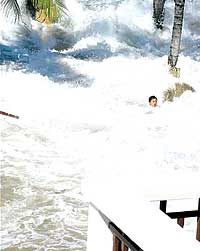 Shortly before midnight on new year's eve, we drove through the villages, which lie on the outskirts of Ubud. On a typical new year's eve, the streets of Bali are crowded with people celebrating. Last Friday, the streets were almost totally empty. As 2004 slipped into 2005 there was silence across the paddy fields, the parties and fireworks were cancelled or turned into fund-raising drives.
Shortly before midnight on new year's eve, we drove through the villages, which lie on the outskirts of Ubud. On a typical new year's eve, the streets of Bali are crowded with people celebrating. Last Friday, the streets were almost totally empty. As 2004 slipped into 2005 there was silence across the paddy fields, the parties and fireworks were cancelled or turned into fund-raising drives. Indonesia is in mourning for its uncountable dead. The appalling physical scale of devastation is almost impossible to take in and one of the things that complicates the relief operation is that those who provide community leadership in times of crisis are dead. Dead also are the shopkeepers, writers, musicians, farmers, fishermen/women and homemakers. Lost are the thoughts, stories, talents and aspirations of several generations.
The Balinese are particularly well placed to empathise with their neighbours in Aceh. The suffering of the 2002 bombs in Kuta, although on a vastly different scale, is still very fresh in the collective memory. Beside the highway leading out of Denpasar, college students hold cardboard donations boxes at traffic lights. In Ubud, Bali's main craft and artistic centre, posters urge people to donate to relief operations.
The emphasis of the drive is the creation of 'care buckets' which will double as water containers. Each bucket is filled with a variety of urgently needed supplies including purification tablets, oral redydration salts, toothbrushes, sanitary napkins, first aid medicines, flashlamps, non-perishable foods, quick drying clothes and stoves.
My brother's friends, Made and Sam, have volunteered. They are builders who are going to use their construction skills, which are usually deployed in building the expensive villas and hotels that dot the Balinese landscape, to help with the clean-up campaign, to assist with the provision of temporary shelters and ultimately with reconstruction. Journeys by sea, however, are hazardous, as piracy is common and despite the best intentions, all relief assistance is moving very slowly.
Aceh is in the throes of a long-running separatist conflict but two days after the tsunami the Free Aceh Movement (GAM) and the Indonesian Military (TNI) stated that they had agreed separately to a temporary halt in hostilities. But the military now states that it is carrying out both 'humanitarian and security operations'. Ongoing hostilities have raised concerns from humanitarian aid workers who fear that the fighting will undermine their relief work and jeopardise their safety and the safety of those they are trying to assist.
The Indonesian media features countless stories of tragedy and destruction but it also chronicles some miracles of survival. Twenty-six-year-old Riza saved her badly injured neighbour's twin daughters but then struggled to swim and hold onto the girls when a snake the size of a telephone pole, which was being carried along by the current, approached her. She and the two nine-year-olds clung to the python and were eventually carried to higher ground.
A Banda Aceh-based reporter tells the story of Haiwati who is due to give birth any day and had taken refuge in a mosque, which was subsequently flooded. As she stood in neck deep water with her son hoisted on her shoulders she prepared for death when a large can floated by. Although exhausted, Haiwati finally summoned up enough energy to cling onto it and was carried to safety.
Aceh's only newspaper, Serambi Indonesi, which has survived threats from both the government and the rebels for its hard-hitting coverage despite the destruction of their printing presses and the likely death of 100 of their 250 staff, was back in circulation six days later.
The plight of 35,000 children either orphaned or separated from their parents, many too young to tell who they are, has touched a deep note across Indonesia. Not all those concerned with children are motivated by altruism, however. More than 20 Acehnese children have reportedly been smuggled out of the area in the aftermath of the disaster and many others are at risk of being trafficked. One organisation was offering Acehnese orphans to potential parents via SMS.
Had the mammoth waves hit here in Bali, the death toll would have been enormous. The celebration of Saraswati on Christmas day was followed on 26 December by Banyu Pinaruh when Hindu Balinese purify themselves in the waters around the island. If the tsunami had occurred here, hundreds of thousands who made the pilgrimage to the beaches that morning would have been killed.
Judy Pettigrew is an anthropologist who has conducted research in Nepal since 1990. She often visits Indonesia where her brother and family live.


